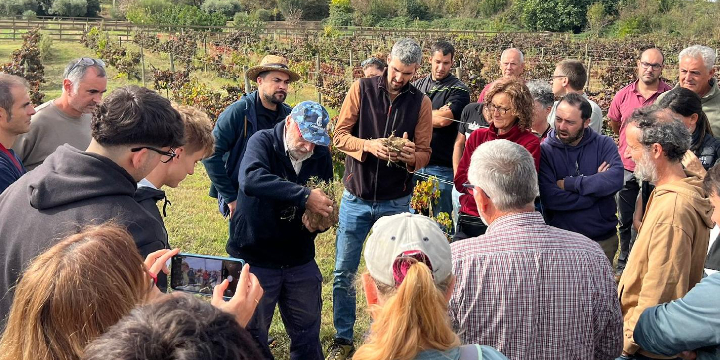
Soil conservation and improvement are key challenges for the future of viticulture, especially in a context marked by climate change and the need to ensure the sustainability of winegrowing operations. With this premise, the “Viticultural Soil Management and Handling” workshop was held this week, organized by INNOVI. The technical meeting aimed to share real experiences and open spaces for collective reflection to generate applied knowledge and inspire new practices that help reduce erosion impact, improve soil health, and ensure long-term productivity.
The objective of the event was to share experiences and knowledge on soil management, based on the presentation of trials carried out during 2024 and 2025 by INCAVI, as well as visits to several benchmark vineyards.
The first stop was at INCAVI’s demonstration microplots for soil management, where three repetitions of four management types were conducted: traditional tillage, traditional tillage with subsoiler, maintenance of vegetative cover, and “aserpiado”. In these plots, runoff water was collected after rainfall to analyze infiltration and suspended solid load.
Initial results show that soils with vegetative cover present better water infiltration and lower soil loss, demonstrating the potential of this system to reduce erosion and improve soil quality.
The event continued with a visit to Parés Baltà, where the technical team shared their experience using cover crops. Although the initial results were positive, the team explained that prolonged drought and water competition between the cover and the vines forced them to remove the cover in some cases. However, they highlighted their commitment to adapting soil management to the type and characteristics of each plot, applying differentiated and site-specific management.
The final visit took place at Mas La Plana (Familia Torres), where two representative plots were observed: one recently planted with a tilled key line system and another with over twenty years of vegetative cover. In both cases, a subsoiler is used to reduce soil compaction.
During the visit, it was noted that in drought years, vineyards with cover crops experienced reduced yields, especially in areas with shallower soils.
Dr. Boixadera, one of the participants, took advantage of the visit to explain how water infiltrates soils with vegetative cover through cavities created by roots. However, high soil compaction was observed, leading the doctor to conclude that “it is necessary to manage compaction as best as possible in order to live with it,” highlighting the need to continue researching and adapting soil management practices to each production context.
The event emphasized the importance of soil as an essential resource for viticulture and promoted an open debate among professionals and producers, with the aim of collectively building a more sustainable and resilient management model to face the current and future challenges of the sector.
Ea sit quaeque consulatu, nam causae nonumes in, ne sea graeci quidam pericula. Id eius scriptorem sit, affert ridens ea eam, no est illum instructior. Cu veri gubergren appellantur vis. Te summo facilisi constituto qui, ad mundi nemore causae pro. Equidem euripidis at vis, mundi intellegat quaerendum ex sit, ea nusquam fierent mea.
Ea pro nisl adhuc consequat. Mei at posse graecis epicurei, novum causae erroribus usu no, ne ubique praesent scribentur quo. Ea vis quod labitur sapientem, qui te putant laoreet sententiae, alii velit vidisse eam ex. Eum ut idque soluta diceret.
Comments